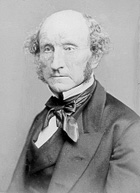J.S. Mill: On Blogs
 John Stuart Mill wrote that "it is always probable that dissentients have something worth hearing to say for themselves, and . . . truth would lose something by their silence." On Liberty. Mill continues: "it is only by the collision of adverse opinions that the remainder of the truth has any chance of being supplied." Id.
John Stuart Mill wrote that "it is always probable that dissentients have something worth hearing to say for themselves, and . . . truth would lose something by their silence." On Liberty. Mill continues: "it is only by the collision of adverse opinions that the remainder of the truth has any chance of being supplied." Id.I thought of Mill's marketplace of ideas as I was visiting Blackprof, one of the best prof blogs on a broad range of issues. Blackprof has very high site traffic, and a very active readership, e.g., some posts elicit hundreds of comments. I enjoy the site in part because it is committed to maintaining an open forum for ideas -- specifically, site managers generally do not filter/approve comments prior to/after posting (a rarity, especially for law prof sites). At times the comments become personally offensive, leading some of the Blackprof community to call for a limited form of censorship. Here is Professor Shavar Jeffries' posting on the issue:
"[Commenters] are the lifeblood of our intellectual community - the richness, unpredictability, and range of [their] contributions enables the lively, informative, and thought-provoking discussions forming the best of what Blackprof has to offer.
. . .
[The regular contributors] reserve the right to edit comments or delete them entirely if they are devoid of substantive significance and amount to nothing more than offensive name-calling. We do not exercise this authority lightly, as our general view is the best way to meet distasteful speech is either with silence or more speech. But, nonetheless, sometimes comments cross the line and require censorship for the broader good of the group."
I tend to agree with Professor Jeffries -- some of the comments amount to nothing more than ad hominem attacks devoid of substantive reflection of the relevant issues. Does this approach conflict with Mill's theory? I doubt that it does. Mill's prized the "collision of adverse opinions" -- are opinions really being exchanged when a web discussion resorts to "name-calling"? Is any "truth" lost by preventing these statements from reaching the Blackprof community on the Blackprof site? (Obviously, those who disagree with the policy can form their own marketplace for ideas, an option all the more relevant considering the ease of establishing a personal blog.) Does censorship fly in the face what drives blogs in the first place? Can any bloggers censor comments and simultaneously avoid the odious (and well-deserved) reputation attached to censorship generally?
Note: Cross-posted at Urban Law Journal.









3 Comments:
"Can any bloggers censor comments and simultaneously avoid the odious (and well-deserved) reputation attached to censorship generally?"
I think you answered this question in your own post:
"I enjoy the site in part because it is committed to maintaining an open forum for ideas -- specifically, site managers generally do not filter/approve comments prior to/after posting (a rarity, especially for law prof sites). At times the comments become personally offensive, leading some of the Blackprof community to call for a limited form of censorship."
Seems like your premise that censorship has an odious reputation is flawed, given that 1) a non-trivial number of users on BlackProf are requesting censorship and 2) BlackProf is one of (perhaps the only?) law prof blog that doesn't engage in censorship.
Now don't get me wrong -- I don't like censorship, especially censoring for content, and AutoAdmit has consistently maintained this hands off policy even when we haven't wanted to. But I don't think it's an accurate characterization to say that censorship, at least in the blog context, is viewed very negatively (though it probably should).
You could pick from Hegel or Habermas as well. I don't think either would condone the pure noise that are some blog comments- there is a certain presumption (particularly in Habermas) that all the parties are actually seeking to move towards a truth, or at least not actively obstructing others who move in that direction.
In the very recent past, it was assumed that anyone who was actively and completely outside the bounds of constructive conversation would be ignored by the media, and hence limited to irritating those people who could directly see/hear them. So we developed a strong real-world norm against censorship- the risk from censorship was high (potentially excluding legitimate voices) and the benefits of censorship were low (after all, pure noisemakers didn't really have a forum and so it didn't require formal censorship to ignore them.) Now that we've all got our own micro-dialectics in blog comments, and now that any anonymous idiot can ruin that for everyone else at low cost to themselves, the cost/benefit analysis has changed. As a result, on the internet, the anti-censorship norm has been eroded. We have to take a more active role- we can't just take it for granted that the high cost of publication will lead to defacto self-censorship.
(I might add that what you are talking isn't really censorship as we traditionally think of it- if I ban a poster from my blog, he can go get his own blog and blather on there. I'm banning him from my website, not banning him from speaking altogether. It isn't like banning someone from the county library, where there is no other county library, or from all corporate media at a time when there was no other way to get the news.)
Anthony:
"Seems like your premise that censorship has an odious reputation is flawed, given that 1) a non-trivial number of users on BlackProf are requesting censorship and 2) BlackProf is one of (perhaps the only?) law prof blog that doesn't engage in censorship."
(1) I disagree that the premise is flawed. The fact that a non-trivial number of users request censorship says nothing about the content of the "objectionable" comments. Indeed, the absence of competing points of view becomes a mere diatribe, not a debate. If Blackprof seeks to create a vibrant debate, the mere presence of objecting community members should not by itself validate their calls for censorship.
(2) The fact that Blackprof is one of the only law prof sites does not invalidate the premise either. The fact that blog-censorship is widespread doesn't validate the practice, or make it any less odious.
I think Luis makes the stronger argument - the ease of alternative venues where malcontents can voice their opinion mitigate concerns about censorship. (Although even here, there is the problem that those malcontents could not reasonably reach the desired Blackprof community by starting spinoff blogs.)
I suppose it comes down to the mission of the particular blog, and the type of desired discussion.
Post a Comment
<< Home